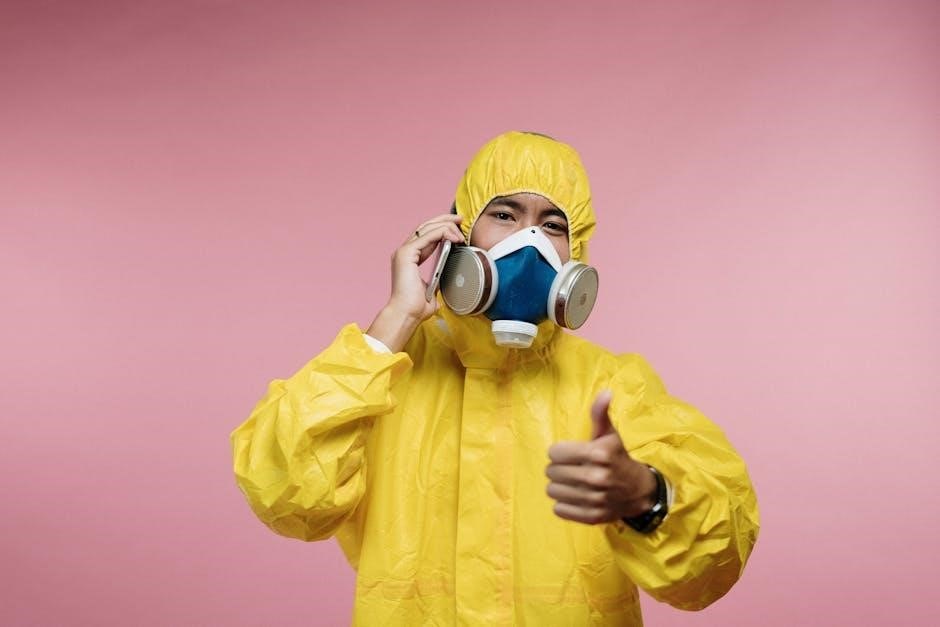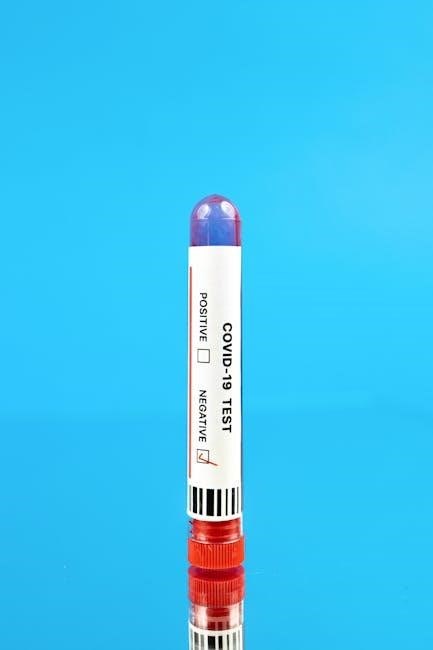
fake positive covid results pdf cvs
The emergence of fake positive COVID results has raised concerns, particularly with CVS test kits, as individuals fabricate documents for benefits like paid leave or travel exemptions.
1.1 Overview of the Issue
The surge in fake positive COVID results, particularly involving CVS templates, highlights a growing concern in pandemic-era testing. Fraudulent documents are increasingly used to obtain benefits like paid leave or travel exemptions. The ease of editing PDF templates online has made it simpler for individuals to fabricate positive results, raising questions about verification processes and public trust. This issue underscores the challenges of ensuring test accuracy and combating misinformation.
1.2 The Role of CVS in COVID Testing
CVS played a significant role in COVID testing by distributing rapid test kits, including Ellume’s at-home tests. However, reports of false positive results led to recalls, impacting public trust. The recall involved 43 lots of Ellume tests sold at CVS and other retailers, affecting approximately 42,000 tests. CVS faced challenges in maintaining test accuracy and combating fraudulent use of PDF templates for fake results, highlighting the need for stricter verification processes.

Understanding False Positive COVID Results
False positive COVID results occur when tests incorrectly indicate infection. Causes include contaminated samples or faulty kits. Such errors can delay proper treatment and spread the virus further.
2.1 Definition and Causes
A false positive COVID-19 result occurs when a test incorrectly indicates a positive diagnosis. Common causes include contaminated samples, faulty test components, or user error. For instance, Ellume’s at-home tests were recalled due to false positives linked to manufacturing issues. Additionally, improper test administration or expired kits can also lead to inaccurate results, undermining the reliability of COVID-19 testing and causing unnecessary anxiety or delayed treatment for individuals.
2.2 Impact on Individuals and Public Health
False positive COVID-19 results can cause significant distress for individuals, leading to unnecessary isolation, delayed treatment for other conditions, and emotional strain. On a broader scale, such errors can distort public health data, creating a misleading picture of disease prevalence and potentially triggering unwarranted fear or policy responses. This undermines trust in testing systems and complicates efforts to manage the pandemic effectively.

Fabrication of Fake Positive Results
The creation of fraudulent COVID test results often involves generating fake templates, such as those for CVS, to deceive individuals or systems for personal advantage.
3.1 Methods of Creating Fake Test Results
Individuals often exploit online templates, such as those for CVS and LabCorp, to create fraudulent COVID results. Editing software is used to alter dates, names, and test outcomes. Some manipulate test kits, like Ellume, to produce false positives. Others use household items, such as cola, to generate fake test lines. Advanced methods involve purchasing counterfeit documents or using dark web resources to design convincing templates.
3.2 Tools and Resources Used
Creating fake COVID results often involves PDF editing software, such as Adobe Acrobat, to manipulate templates from CVS and other providers. Online design tools, like Canva, are used to replicate test result layouts. Additionally, dark web resources offer counterfeit documents and stolen logos for authenticity. Some individuals exploit test kit vulnerabilities, such as Ellume recall issues, to produce false positives. These tools enable the fabrication of convincing yet fraudulent test results.

Risks and Consequences
Fabricating fake positive COVID results poses severe risks, including delayed treatment for actual illnesses and legal repercussions for fraud. Public health efforts are also undermined.
4.1 Health Risks and Delayed Treatment

False positive COVID results can lead to delayed treatment for other illnesses with similar symptoms, worsening health outcomes. Misdiagnosis may result in unnecessary isolation or inappropriate care, potentially harming individuals. The psychological impact of believing one has COVID-19, when false, can also cause distress. Accurate testing is crucial to prevent such risks and ensure proper medical intervention.
4.2 Legal and Ethical Implications
Generating fake positive COVID results is illegal, with potential criminal charges for fraud and forgery. Ethically, such actions undermine public trust in healthcare systems and exploit resources meant for those truly in need. Individuals and institutions must uphold integrity to ensure accurate testing and maintain ethical standards during the pandemic. Legal consequences, including fines and penalties, further highlight the severity of this misconduct.

Real-World Examples and Case Studies
Notable cases include the Ellume recall of at-home tests sold at CVS and other retailers due to widespread false positives. Additionally, incidents of individuals using cola to create fake positive results have been documented, highlighting the vulnerabilities in COVID testing systems and the potential for misuse.
5.1 The Ellume Recall Incident
In 2021, Ellume, an FDA-authorized COVID test manufacturer, recalled 427,000 at-home test kits due to a high rate of false positives. Sold at retailers like CVS, Amazon, and Walmart, the affected lots were distributed between April and August; Approximately 42,000 tests produced positive results, including false positives. Ellume removed affected products from stores and notified customers, while the FDA collaborated to ensure corrective measures. This incident underscored the risks of false positives and the importance of test accuracy.
5.2 Other Notable Cases Involving CVS
Several incidents involving CVS highlight the broader issue of fake positive COVID results. Beyond the Ellume recall, reports of false positives from CVS home tests emerged, with users exploiting template forgeries. Fraudulent activities, such as selling forged results, added complexity. Notably, some individuals, including children, used cola to create false positives, undermining trust in testing systems and public health efforts.

Detecting and Preventing Fake Results
Detecting fake results involves rigorous verification processes and advanced authentication methods. Raising awareness and promoting honest reporting are crucial in preventing fraud and maintaining trust in COVID testing systems.
6.1 Verification Processes
Verification processes for COVID test results involve checking the authenticity of documents through barcode scans and digital authentication. CVS and other providers use secure systems to validate results, reducing fraud. Cross-referencing with medical records and lab data helps ensure accuracy. The FDA collaborates with manufacturers to implement stricter quality controls, minimizing false positives. Public education campaigns also play a role in preventing misuse of fake positive results and promoting trust in testing systems.
6.2 Strategies to Combat Fraud
Combatting fraud involves implementing advanced authentication methods for COVID test results, such as unique identifiers and digital signatures. Enhancing public awareness campaigns to educate individuals about fraudulent activities is critical. Strengthening collaboration between manufacturers, distributors like CVS, and regulatory bodies ensures timely detection of fake results. Regular audits and inspections of test production and distribution channels also play a key role in preventing fraud and ensuring the integrity of COVID testing systems.

Impact on COVID Testing Accuracy
False positives undermine the reliability of COVID testing, leading to misleading data and potential health risks from delayed treatment or unnecessary quarantines, affecting public health response accuracy.
7.1 Effects on Test Reliability
False positive COVID results significantly compromise test reliability, leading to inaccurate data interpretation and potential health risks. The Ellume recall highlighted this issue, as certain batches produced false positives, undermining confidence in rapid testing kits. Such errors can mislead public health responses, creating challenges in tracking genuine cases and implementing effective measures. The integrity of COVID testing systems is crucial for reliable outcomes.
7.2 Public Trust in Testing Systems
False positive COVID results and the availability of fake templates have eroded public trust in testing systems. Incidents like the Ellume recall and fraudulent documents undermine confidence in test accuracy. When individuals can manipulate or fabricate results, it discourages genuine participation in testing programs, hindering efforts to track and control the pandemic. Restoring trust requires robust verification processes and transparency in addressing testing flaws.

Ethical Considerations
The fabrication of fake positive COVID results involving CVS raises significant moral concerns, as it exploits public trust and undermines efforts to combat the pandemic responsibly.
8.1 Moral Implications of Fabrication
The creation of fake positive COVID results, particularly involving CVS templates, raises profound ethical dilemmas. Fabricating such documents exploits public trust in healthcare systems, leading to potential misuse of resources and delayed treatment for those truly in need. This deception undermines collective efforts to manage the pandemic, placing additional strain on public health infrastructure and eroding confidence in test accuracy. The moral responsibility lies not only with individuals but also with institutions to prevent such fraud and ensure accountability.
8.2 Responsibility of Individuals and Institutions
Individuals must avoid exploiting fake positive COVID results for personal gain, as this compromises public health efforts. Institutions, including CVS and regulatory bodies, bear the responsibility to ensure test accuracy and security. Proactive measures, such as implementing robust verification processes and educating the public, are essential to uphold trust and integrity in COVID testing systems. Accountability for fraudulent actions must be enforced to safeguard collective health interests.
The rise of fake positive COVID results underscores the need for stricter regulations and public awareness. Ensuring test accuracy and integrity is crucial to maintaining trust in healthcare systems.
9.1 Summary of Key Findings
The analysis reveals that fake positive COVID results, particularly involving CVS templates, pose significant risks to public health and trust. False positives delay proper treatment, spread misinformation, and undermine testing systems. The Ellume recall highlighted manufacturing flaws, while fraudulent templates exploit vulnerabilities for personal gain. Addressing these issues requires enhanced verification processes, stricter regulations, and public education to ensure test integrity and maintain confidence in COVID-19 testing systems.
9.2 Moving Forward: Ensuring Test Integrity
Ensuring test integrity requires robust verification processes, enhanced quality control, and public education to combat fraud. Implementing digital authentication for CVS results and stricter penalties for fabrication can deter misuse. Collaboration between manufacturers, like Ellume, and regulators is vital to maintain trust and accuracy in COVID testing systems, safeguarding public health and restoring confidence in diagnostic tools.